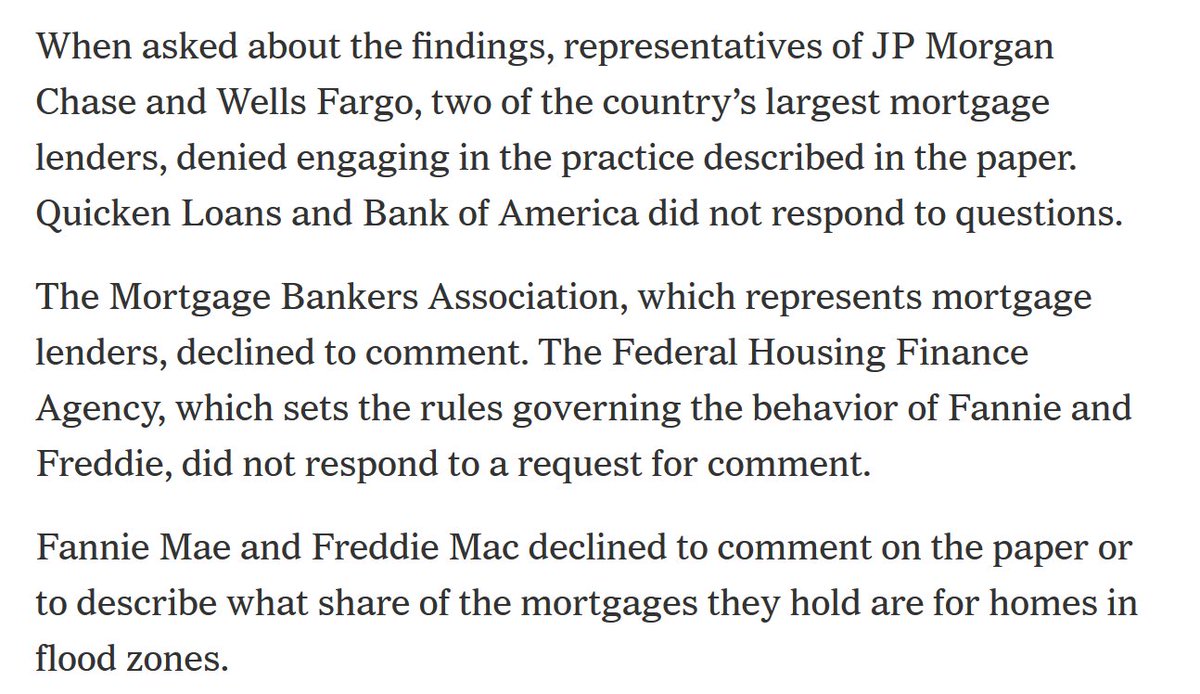My latest @climate column is on a topic I've been thinking about for a long time: what does the new fad for commercialised, precision predictions of climate change impacts mean for society? https://www.bloomberg.com/news/articles/2020-06-26/lenders-with-the-best-climate-data-will-be-in-a-position-to-discriminate?sref=63ZrW3mM
If you haven't heard of these services, they combine geolocation data + information about physical assets, (and sometimes transit/logistics, supply chains etc) + info from climate models. The final product is analysis or advice on financial risks from climate impacts.
These services are often developed, provided and purchased by people who work in "climate risk" "sustainability" or "resilience".
AFAIK it's usually done with noble intentions: the more we know about climate change, the more resilient we can be. But...
AFAIK it's usually done with noble intentions: the more we know about climate change, the more resilient we can be. But...
1) Who's the "we" who's getting the information?
The clients of these services are generally the sorts of organisations who can afford such bespoke, technically sophisticated consulting. Plenty of (bigger) financial institutions are enthused about this.
The clients of these services are generally the sorts of organisations who can afford such bespoke, technically sophisticated consulting. Plenty of (bigger) financial institutions are enthused about this.
There are a lot of financial institutions talking about this, including Blackrock. And companies with big physical asset footprints that require long-term planning: eg @cflav wrote last year about AT&T using analytics developed from Argonne Labs: https://www.bloomberg.com/news/articles/2019-03-27/at-t-beset-by-disaster-costs-turns-to-30-year-climate-modeling?sref=63ZrW3mM
My next question is:
2) Who gets to see that information? Unsurprisingly, those making or commissioning this analysis probably aren't going to just share it with everyone else. My thread on the AT&T story notes the company was a bit coy about this: https://twitter.com/kmac/status/1118300393618853888
2) Who gets to see that information? Unsurprisingly, those making or commissioning this analysis probably aren't going to just share it with everyone else. My thread on the AT&T story notes the company was a bit coy about this: https://twitter.com/kmac/status/1118300393618853888
Similar from Chris's more recent story on how climate is undermining the 30-year mortgage. Notice how in this, and other stories drawing on the same research, the banks aren't keen to talk about how they're using it? https://www.nytimes.com/2020/06/19/climate/climate-seas-30-year-mortgage.html?searchResultPosition=3
There's a LOT of non-commenting from the banking industry in another story on the topic: https://www.nytimes.com/2019/09/27/climate/mortgage-climate-risk.html
You best believe, though, that when those banks are talking to the ESG teams from pension funds who own their shares, they are very much happy to declare how well they're managing their climate risks. Ditto, I suspect, when they talk to regulators lately.
Final question: what happens with this information? In the column I used a trading analogy, but this will likely play out in less liquid decisions: do we keep making infra investments in X (climate-exposed) region, or begin to direct it towards Y (less exposed) region?
If you're a bank or other lender, you are sure as hell going to start curtailing credit availability in those regions, and reducing your exposure by palming off the mortgages to someone else.
It's not conspiratorial; it's just a logical way to respond to such information.
It's not conspiratorial; it's just a logical way to respond to such information.
But are you going to advertise the fact? Of course not, unless you have to. Why share your edge with your competitors? Why alert the local real estate markets and risk kicking off a downward price spiral before you've had time to cull the mortgages from your books?
So, my previous column was about the credibility, trust, and standardisation of this type of climate data. That's something I also think is a huge issue, but one that will probably be, over time, resolved - because the relevant parties are all incentivised to do so.
However the situation I'm talking about this time - the potential of commercial climate analytics to entrench disadvantage - in a sense, it doesn't matter how good the analytics are.
It just matters that they're obtained, and acted upon by those who can buy & act on it.
It just matters that they're obtained, and acted upon by those who can buy & act on it.
So, the actual information itself, if it's limited to those who can afford to access and act on it, can hasten and amplify something that's already understood to be a big feature of climate change: that it tends to exacerbates disadvantage.
If it was more openly discussed and considered that might be reassuring - but to my knowledge, it's really not. It shouldn't be too hard to see that new forms of expensive information that *explicitly* examines both location and the future, might not be great for everyone.
It's a bit like AI... yeah, it can be good, but good for whom, and in what situations? And will those who it's harming even know?
Anyway.
Anyway.
As an aside: most of these service incorporate information from global or regional climate models that are publicly-funded. Is it going to the public good? http://science.sciencemag.org/lookup/content/full/365/6459/1240?ijkey=9pvPhHjDZA8sc&keytype=ref&siteid=sci
That leads to some Big Questions about climate change and particularly adaptation which are uncomfortable for many. Climate change is an inherently political, because it involves countless changes, each of which will have winners & losers.
The information that's available about climate impacts will shape the responses to it. And everyone has skin in the game when it comes to accessing housing finance (or any finance); or availability of infrastructure; or local government funding. /ends

 Read on Twitter
Read on Twitter


